| 14 October |
• yesterday • tomorrow |
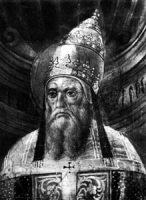
• Callixtus I
• Calixtus I
Born a slave, owned by Carpophorus, a Christian in the household of Caesar. His master entrusted a large sum to Callistus to open a bank, which took in several deposits, made several loans to people who refused to pay them back, and went broke. Knowing he would be personally blamed and punished, Callistus fled, but was caught and returned to his owner. Several depositors begged for his life, believing he had not lost the money, but had stolen and hid it. They were wrong; he wasn't a thief, just a victim, but he was sentenced to work the tin mines. By a quirk of Roman law, the ownership of Callistus was transferred from Carpophorus to the state, and when he was later ransomed out of his sentence with a number of other Christians, he became a free man. Pope Zephyrinus put Callistus in charge of the Roman public burial grounds, today still called the Cemetery of Saint Callistus. Archdeacon. Sixteenth Pope.
Most of what we know about him has come down to us from his critics, including an anti-Pope of the day. Callistus was on more than one occasion accused of heresy for such actions as permitting a return to Communion for sinners who had repented and done penance, or for proclaiming that differences in economic class were no barrier to marriage. This last put him in conflict with Roman civil law, but he stated that in matters concerning the Church and the sacraments, Church law trumped civil law. In both cases he taught what the Church has taught for centuries, including today, and though a whole host of schismatics wrote against him, his crime seems to have been to practice orthodox Christianity. Martyred in the persecutions of Alexander Severus.
c.218
• martyred c.223
• legend says he was killed by being thrown down a well with a millstone around his neck, but there is no solid evidence
cemetery workers
pope with a millstone on him or nearby
https://catholicsaints.info/pope-saint-callistus-i/
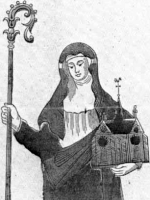
Andragasyna, Angadreme, Angadresima, Angadrême, Angradesma
27 June - procession instituted by King Louis XI to celebrate the protection of Saint Angadrême when Beauvais, France was besieged in 1472
Cousin of Saint Lambert of Lyon. Educated in Therouanne by Lambert and Saint Omer. She felt drawn to religious life from an early age, but was promised in an arranged marriage to Saint Ansbert of Chaussy. Dreading marriage, Angadrisma prayed for a miracle to prevent it; she was striken with leprosy. The marriage was broken off, Ansbert married some one else, and Angadrisma became a nun; the leprosy was cured the moment she received the veil from Saint Ouen, archbishop of Rouen. Abbess of the Benedictine monastery of Oroër-des-Vierge near Beauvais, France. Miracle worker. Once stopped a fire that was about to destroy her monastery by praying while holding up the relics of the house's founder, Saint Ebrulf of Ouche.
c.615 in the Diocese of Thérouanne, France
• c.696 at the Oroër-des-Vierge Abbey, Beauvais, France of natural causes
• relics transferred to the Church of Saint Michael in Beauvais in 851 when invading Normans destroyed Oroër-des-Vierge Abbey
• relics transferred to the Cathedral of Beauvais during the French Revolution
• against drought
• against fire
• against slander
• Beauvais, France, city of
• Beauvais-Noyon-Senlis, France, Diocese of
https://catholicsaints.info/saint-angadrisma-of-beauvais/
20 June as one of the Irish Martyrs
Son of a wealthy merchant; as a young man Richard worked in his father's business. However, feeling a call to the priesthood, he studied at the University of Leuven, Belgium where he was an excellent student, and was ordained in 1555. He returned to Limerick, Ireland in 1556 and opened a school in an abandoned Dominican friary there. Chosen archbishop of Armagh, Ireland on Low Sunday in 1564. Arrested in December 1564 for the crime of acknowleding the authority of the Pope over the Church. After several months in prison, and multiple interrogations, Creagh escaped from the Tower of London on 29 April 1565 and fled to Leuven. He went from there to Spain and then back to Ireland in July 1566, resuming his ministry and preaching peace between the Irish and English. Arrested on 30 April 1567 in Kinelea, Ireland. A Dublin jury refused to convict Richard of anything, and his jailer helped him to escape, but in October 1567 Richard was arrested yet again, and again imprisoned in the Tower of London. He was kept chained, periodically interrogated, and systematically abused for years; he lost all his teeth and the use of one leg. Richard was released on bail in March 1570, and returned to Ireland where he resumed his ministry. Arrested again in May 1574, he was imprisoned in Dublin until February 1575 at which point he was returned to the Tower of London where he stayed until his death. While there, the periods when he was unchained, he ministered to other prisoners. Martyr.
1523 in Limerick, Ireland
possibly poisoned (evidence inconclusive) on 14 October 1586 in the Tower of London, England
27 September 1992 by Pope John Paul II in Rome, Italy
https://catholicsaints.info/blessed-richard-creagh/
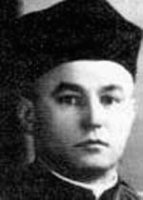
12 June as one of the 108 Martyrs of World War II
Priest in the diocese of Radom, Poland, Father Franciszek was a noted Bible scholar, and taught at the University of Warsaw. Arrested by the Gestapo in November 1939 as part of the Nazi occupation of Poland in World War II, he was transferred from one prison to another, ending at the Dachau concentration camp. There he ministered to other prisoners and set an example for them of living the truth of the Faith. Martyr.
19 December 1889 in Wysmierzyce, Mazowieckie, Poland
gassed on 14 October 1942 in the gas chambers of the prison camp at Dachau, Oberbayern, Germany
13 June 1999 by Pope John Paul II in Warsaw, Poland
Now I understand better and am more and more convinced that the most beautiful and most important, but most difficult for us prayer is the prayer of Christ in the Garden of Olives: ‘Father, let your will be done.’ I am trying to pronounce this prayer every day and with deep conviction and living faith in the ‘Our Father’ and always remain in the closest union with Christ. - Blessed Franciszek, writing from Dachau
https://catholicsaints.info/blessed-franciszek-roslaniec/
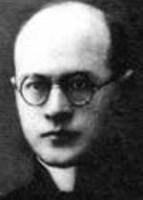
12 June as one of the 108 Martyrs of World War II
Priest in the archdiocese of Lublin, Poland. He served as a catechist and developed a personal ministry to the poor, the elderly and the handicapped. He was arrested with several other priests by the Gestapo in November 1939 as part of the Nazi occupation of Poland. For the crime of being a priest, he was sentenced to death, and over the next three years he was imprisoned and repeatedly tortured in the Sachsenhausen and Dachau concentration camps; he spent his time ministering to fellow prisoners. Martyr.
14 September 1896 in Wojslawice, Lubelskie, Poland
gassed on 14 October 1942 in the gas chambers of the prison camp at Dachau, Oberbayern, Germany
13 June 1999 by Pope John Paul II in Warsaw, Poland
https://catholicsaints.info/blessed-stanislaw-mysakowski/
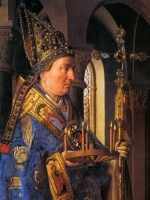
Donas, Donatianus, Donatien, Donazianus
Seventh bishop of Rheims, France from 360 to 390.
4th century in Rome, Italy
• 390 of natural causes
• bones enshrined at Corbie, France
• relics relocated to Torhout, Belgium
• Charles the Bald later gave the relics to Earl Baldwin of Flanders
• relics translated to Bruges, Belgium in 863
• relics enshrined in the cathedral in Bruges
• Bruges, Belgium, city of
• Bruges, Belgium, diocese of
• Rheims, France
• West Flanders, Belgium
bishop holding a wheel outlined in candles
https://catholicsaints.info/saint-donatian-of-rheims/
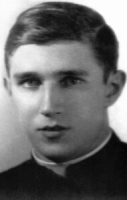
2 April as one of the Martyrs Killed Communist Regimes in Eastern Europe
Greek Catholic. Graduated from the Lviv Theological Academy. Married. Ordained on 28 August 1941. Pastor of the Archeparchy of Lviv for the Ukrainians. Arrested for his faith on 9 September 1949 by the NKVD; imprisoned on Lontskoho Street, Lviv. Noted for loudly singing Psalms while in prison; his keepers thought he'd lost his mind. Died in prison; martyr.
14 August 1914 at Horodok, Lviv District, Ukraine
tortured and starved to death on 14 October 1949 in prison at Lviv, Ukraine
27 June 2001 by Pope John Paul II at Ukraine
https://catholicsaints.info/blessed-roman-lysko/
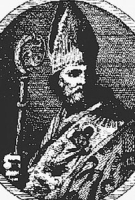
Gaudenzo, Gaudenzio
Immigrant to Rome, Italy c.308; ordained there in 332. Evangelizing bishop of Rimini, Italy in 346. Ordained Saint Marinus as deacon. Attended the Council of Rimini in 359 which condemned Arianism. Murdered by Arians. Martyr.
Ephesus, Asia Minor
14 October 360
• Montefabbri, Italy
• Ostra, Italy
• Rimini, Italy
https://catholicsaints.info/saint-gaudentius-of-rimini/
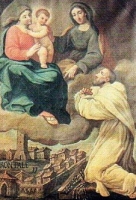
Domenico Loricato
To get Dominic ordained, his parents made a gift to their local bishop, committing the sin of simony. Learning of it, Dominic devoted himself to penance, even wearing an iron cuirass next to his skin. Hermit at Luceolo, Italy. Hermit in Montefeltro, Italy. Monk at Fonte Avellano Abbey. Spiritual student of Saint Peter Damian.
995 in Italy
1060 of natural causes
https://catholicsaints.info/saint-dominic-loricatus/
Berhard of Arce
13 September - translation of his relics
Pilgrim to the Holy Lands and then to Rome, Italy. Hermit at Arpino, Italy.
• 9th century of natural causes
• relics at Rocca d'Arce, Italy where many miracles have been reported in connection with them
Rocca d'Arce, Italy
https://catholicsaints.info/saint-bernard-of-arce/
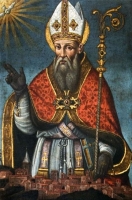
Bishop of Todi, Italy. Saved Todi from being sacked by Totila the Goth. Converted many and showed the power of God over idols by destroying a temple of Pan and using the materials to build a church.
537
Falerone, Italy
https://catholicsaints.info/saint-fortunatus-of-todi/
Manechildis, Ménéhould, Manechilde
Youngest of seven sisters, all of whom are honoured as saints in parts of Champagne, France. Hermitess. Nun, receiving the veil from Saint Alpinus.
Perthois, France
c.490
Sainte-Ménéhould, France
https://catholicsaints.info/saint-manehildis/
Manaccus, Manakus
Sixth century monk. Abbot at Caer Gybi in Holyhead, Anglesey, Wales. Worked with Saint Cuby of Caernarvon. Manaccan, Cornwall is named for him.
in Cornwall, England
Manaccan, Cornwall, England
https://catholicsaints.info/saint-manacca/
Bishop of Trier, Germany. Accused of sexual impurity, Rusticus feared the scandal would harm the faith of this parishioners, so he resigned and spent his remaining days as a hermit at Saint Goar.
574 of natural causes
https://catholicsaints.info/saint-rusticus-of-trier/
Bishop of Luni, Italy from 594 to c.604. Friend of Saint Gregory the Great who wrote about Venanzio’s personal piety and his apostolic zeal.
6th century Piacenza, Italy
early 7th century
https://catholicsaints.info/saint-venanzio-of-luni/
Celestio, Céleste, Celestius
Priest. Evangelist in the area of Metz, France. Second bishop of Metz.
3rd century
4th century of natural causes
https://catholicsaints.info/saint-celeste-of-metz/
Lupulo
Martyr.
Caesarea, Cappadocia (in modern Turkey)
https://catholicsaints.info/saint-lupus-of-caesarea/
Martyr.
Caesarea, Cappadocia (in modern Turkey)
https://catholicsaints.info/saint-saturninus-of-caesarea/
Martyr.
Capua, Campania, Italy
https://catholicsaints.info/saint-modesto-of-capua/
Martyr.
Capua, Campania, Italy
https://catholicsaints.info/saint-lupulo-of-capua/
Three brothers and a sister martyred together in the persecutions of Diocletian - Carponius, Evaristus, Fortunata and Priscian.
• in 303 in Caesarea, Cappadocia (in modern Turkey)
• relics enshrined in Naples, Italy
https://catholicsaints.info/martyrs-of-caesarea/
Thousands of people were murdered in the anti-Catholic persecutions of the Spanish Civil War from 1934 to 1939. I have pages on each of them, but in most cases I have only found very minimal information. They are available on the CatholicSaints.Info site through these links:
• Blessed Ana María Aranda Riera
• Blessed Félix Barrio y Barrio
• Blessed Isaac Carrascal Moso
• Blessed Jacques Laigneau de Langellerie
• Francis of Silos
CatholicSaints.Info Portable Edition